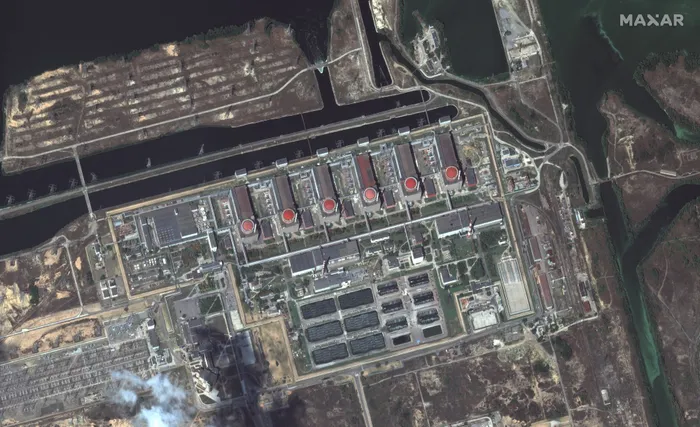Kremlin warns of ‘sabotage’ at Ukrainian nuclear plant

Picture: Handout/Satellite image ©2022 Maxar Technologies/ AFP/Released August 19, 2022 – This handout satellite image courtesy of Maxar Technologies released on August 19, 2022, shows the Zaporizhzhia nuclear power plant, situated in the Russian-controlled area of Enerhodar, eastern Ukraine.
By Fredrick Kunkle, Francesca Ebel and Natalia Abbakumova
KRAMATORSK, Ukraine – The Kremlin said Wednesday that Ukraine is preparing an attack on the Zaporizhzhia nuclear power plant in Russian-occupied territory, raising fears of a disaster as each side accuses the other of potential sabotage at the facility, which Moscow’s forces control.
In recent days, Kyiv and Moscow have traded allegations that a false-flag attack is looming, with Ukrainian officials, including President Volodymyr Zelenskyy in his nightly address Tuesday, saying that Russia was laying the groundwork for an operation it would seek to blame on Ukraine. Zelenskyy said that Russia has planted explosives around the plant’s nuclear reactors and has mined its cooling pond.
Russian forces are occupying the city of Enerhodar, where the plant is located, but the Kremlin insisted that Ukraine was planning to damage the facility. “The threat of sabotage by the Kyiv regime is high,” Kremlin spokesperson Dmitry Peskov claimed Wednesday without providing any basis for his allegation. Such sabotage could have “catastrophic” consequences, Peskov said.
Moscow has repeatedly denied attacks on Ukrainian civilians despite evidence that its forces have bombed apartment buildings and other civilian facilities and targeted power infrastructure this winter that forced people far from the front line to be without crucial heating.
Ukrainian officials have said the odds of an accidental release of radiation at the Zaporizhzhia plant have increased since the destruction of the Kakhovka dam, an act that Kyiv has blamed on Russian forces.
Russia has denied destroying the dam, which is located in Russian-occupied territory and was under Moscow’s control at the time of its collapse.
Peskov on Wednesday blamed the destruction of the dam on Kyiv, but Russia has not provided evidence and has not explained how Ukraine could have carried out such an act. The destruction of the dam, located downstream from the nuclear plant, led to catastrophic flooding and drained the reservoir of water needed to cool the reactors and spent nuclear fuel.
Peskov also claimed that Russian forces have taken steps to counter a threat to the plant by Ukraine.
“The situation is quite tense,” Peskov said. “The Kyiv regime has repeatedly demonstrated its willingness to not hesitate to do anything – most recently we saw during the bombing of the Kakhovka hydroelectric power plant, also with horrific consequences.”
The nuclear plant has had several close calls because of fighting nearby.
The Institute for the Study of War said in an analysis published Tuesday that while each side has escalated its rhetoric, it was “unlikely” Moscow would create a nuclear disaster.
The institute said that provocative statements – and possibly provocative acts – are intended as propaganda to accuse Ukraine of irresponsible behaviour near the plant ahead of an upcoming Nato leaders’ summit.
Russian forces seized control of the nuclear plant and the dam shortly after President Vladimir Putin ordered the invasion of Ukraine in February 2022.
Meanwhile, two border regions in western Russia were attacked early Wednesday, wounding at least one person, according to local authorities. Belgorod’s regional governor, Vyacheslav Gladkov, wrote on Telegram that the town of Valuyki – about 110 miles east of the Ukrainian city of Kharkiv – was shelled for “more than an hour”, damaging power lines and homes. A woman was injured in the chest by shrapnel and was taken to a hospital for treatment, Gladkov added.
The governor of Russia’s Kursk region, Roman Starovoyt, also said Wednesday that the village of Tetkino had been attacked. A house and a school were damaged, but no one was injured, he said. The reports could not be independently verified.
Attacks on Russian regions bordering Ukraine have been occurring nearly daily in recent months. Russian officials blame either Ukrainian forces or pro-Ukrainian saboteurs, but Kyiv has not accepted responsibility.
Wednesday’s attacks followed an unsuccessful drone attack on Moscow on Tuesday, which briefly grounded all flights from Vnukovo airport, located in the southwest of the city. Vnukovo is one of Moscow’s three major civilian airports but also typically the one used by government planes, including those of Putin.
“An attempt by the Kyiv regime to carry out a terrorist attack by five unmanned aerial vehicles against facilities in Moscow region and New Moscow was foiled this morning,” Russia’s Defence Ministry said in a statement Tuesday.
According to the ministry, four drones were intercepted over the Russian capital, and another was taken down over the city of Odintsovo, in the Moscow region. In May, drones attacked the capital for the first time since the start of Russia’s full-scale invasion, provoking Putin to promise that Moscow’s air defence systems would be reinforced.
Meanwhile, one person was killed and 25 were injured in a strike in Russian-occupied Makiivka, in the Donetsk region of eastern Ukraine, on Tuesday evening, the Russian-appointed local authorities said in a Telegram post.
Denis Pushilin, the leader of occupied Donetsk, said that “a number of apartment buildings, hospital buildings, schools and kindergartens were damaged”. The Ukrainian military’s strategic communications office said its forces destroyed a Russian formation in Makiivka, Reuters reported.
Abbakumova reported from Riga, Latvia. Ebel reported from Kyiv.
This article was published in The Washington Post